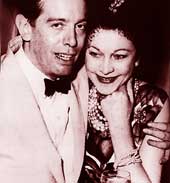|
|
| With Vivien Leigh, c. 1963 |
The Diaries of Kenneth Tynan Edited by John Lahr, Bloomsbury, £ 20
It is a pity that Kenneth Peacock Tynan will be remembered — if at all — as the English producer of the longest running sex-revue, Oh! Calcutta! (opening in the mid-Seventies and carrying on until the end of the Eighties), and for creating a huge national scandal by saying “fuck” for the first time on BBC. He was a relentlessly brilliant theatre critic for the Observer and The Spectator throughout the Fifties and the early Sixties, including a two-year stint as senior drama critic of The New Yorker. In 1962, Tynan wrote to the newly appointed head of the National Theatre in London, Sir Laurence Olivier, asking to be made the NT’s first dramaturg. “How shall we slaughter the little bastard?” Olivier asked his wife. The best way, they decided, would be to make him the National’s in-house critic and literary manager. Tynan held this position from 1963 to 1973, with his own words pinned above his writing table: “Rouse tempers, goad and lacerate, raise whirlwinds.” When he died at the age of 53 in 1980, Tom Stoppard, turning to Tynan’s children at the funeral, spoke for those who were working in the English-speaking theatre during the Fifties and Sixties: “Your father was part of the luck we had”.
After a fervidly precocious time at Oscar Wilde’s college in post-war Oxford, Tynan quickly outgrew the “sterile emptiness” of his humdrum Midlands origins and established himself as a critic by his mid-twenties. Tynan’s career as a theatre critic was shaped by the British theatrical resurgence after World War II, largely enabled by the 1945 Education Act, that made it possible for a very new class of talent to go to the universities and acting schools which had hitherto been the privilege of the Bright Young Things. This dynamic new pool of working-class talent — Joan Plowright, Peter O’Toole, Richard Burton — called for a different kind of play, driving British theatre forward from the “accepted” avant garde of Fry, Eliot and Anouilh, towards the New Wave, the “drift towards anarchy” with plays like Joe Orton’s Loot or more famously, Osborne’s Look Back in Anger, passionately reviewed by Tyn- an as the “best young play of its decade”.
The diaries cover the period, 1971-1980. This was England’s kinkiest and most Conservative decade, whose schizoid essence is most unforgettably captured in Oh! Calcutta!’s dark twin, Hitchcock’s Frenzy. Tynan in the Seventies is a “libertarian socialist”, furiously opposed to censorship and the Common Market, and struck by “how very much life has been improved and civilized by the abolition of the law against adult queerness”. In the theatre, orthodoxy is embodied in that “obtuse lick-spittal”, Olivier, whose “sad old brain” instantly sniffs danger when Tynan proposes Germaine Greer’s adaptation of Lysistrata for the National: “Won’t she fill it up with cocks and cunts?” The Royal Shakespeare Company, extravagantly trying to prove Shakespeare our contemporary, is another bastion of English mediocrity (“A vogue-word I really detest is ‘relevant’.”). Meanwhile, his other contemporary, Harold Pinter, is getting increasingly “preoccupied with the minor emotional crises of the urban middle class”. “The English specialize in the barely concealed yawn when faced with something surprising.” And against this defensive parochialism, Tynan pits the political theatre of Brecht’s Berliner Ensemble and the irresistible vigour of the best of Hollywood, from Judy Garland and Marlene Dietrich, Orson Welles to Marlon Brando.
The range of Tynan’s intellectual and cultural registers eagerly transgresses the boundaries of Englishness. The diaries are overseen by two guardian angels, as irreconcilably different from each other as C.S. Lewis and Orson Welles. As his tutor at Magdalen, Lewis kindly undertook to read out Tynan’s weekly essays because Tynan stammered, “and the prospect of hearing my words pronounced in that wonderfully juicy and judicious voice had a permanently disciplining effect on my prose style”. On the other hand, Welles’s Citizen Kane was the “biggest cultural event” of his early life, and together with the American films, writers and music gobbled up as a youngster, gave Tynan a very American sense of individualism, drawing him towards Hollywood, where he spent his last years. Welles’s “bravura personality” embodied for Tynan the notion of a work of art as a “solo performance”, affecting all his attitudes towards theatre, cinema and, indeed, life. His first wife, Elaine, called him one of “Destiny’s tots”, who marry young because they need “someone to watch them come into being”. (“Was Elaine a trial?” Cyril Connolly once asked Tynan. “No, more of a jury,” he answered.)
What the diaries also invite us to watch is Tynan’s own private Theatre of Cruelty, which is as much of a sophisticated and entertaining performance as is the savouring of most other pleasures in his life. One of the entries is an inventory of “desired things”. In Class A of this list, the sun, “the company of people I love” and “good food and wine” are followed by “the propinquity of a female bottom I can quite freely whip”. His two wives, Elaine and Kathleen, didn’t quite enjoy being spanked and caned as much as he would have liked them to. But in Nicole, he found the perfect “fellow spanking addict” whose fantasies exactly matched his, and with whom he had a long and endearingly narrated relationship, running parallel to his marriage with, and in full knowledge of, Kathleen. Between wonderfully droll accounts of their mutual whipping sessions there are vivid little snippets from his post-coital conversations with Nicole, in which she emerges as a shadowy, but emotionally evolving presence, coming up with such aperçus as “I never give myself, because I’m afraid I shan’t get myself back. I live in constant fear of being stolen. (Said with mock gravity)” Sado-masochism induced in Tynan a wryly articulate reflectiveness, extending his range of creative and intellectual play. The diary entries seldom sound sleazy or lugubrious, and even the excruciating aftermath of a vodka enema becomes a virtuoso piece of comic writing that would have delighted the Earl of Rochester: “Poetic justice is thus visited upon me, anal fixatee that I am, and translated into farce.”
There is a rich vein of pleasure and sheer delight, of an irrepressibly sociable variety, running through Tynan’s diaries — the enchanting privilege of the company of some of the world’s most brilliant artists and entertainers. Marlene Dietrich, John Gielgud, Muhammad Ali, Vivien Leigh, Elizabeth Taylor. Yet, a profound awareness of death haunts the pages of this book, bringing with it a fear of squandered brilliance and time, of having indulged all the symptoms of genius without the disease. “I used to have a sign by my desk: ‘Be light, stinging, insolent and melancholy.’ But I am no longer any of these things, except melancholy.” “The core of it — the tone” is lost, bringing a terrible emptiness which is so different from the blissfully liberating emptiness “of off-season Paris”, through which one could drift irresponsibly.
Bedridden with the emphysema that would eventually kill him, Tynan concocts an account of the fossilized remains of the “pseudo-lizard”, Tynanosaur, its “cerebral hemispheres...filled with rust, used stamps and bird droppings”: “we have here a creature which, long before physical death overtook it, had already become partially extinct”. There are several entries in the Hollywood diaries about selecting music for his funeral — Mozart’s Clarinet Quintet, “A Day in the Life” by the Beatles. And suddenly, an image that stares back from the changing-room mirror in a clothes shop, of “a stricken, blotchy, corpse-pallid, double-chinned, river-veined wreck”.












